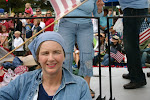Book Review: Electricland (2010 Wapshott Press)
-- Stephen King
Best-selling writer Stephen King may consider Valley of the Dolls, Flowers in the Attic, and The Bridges of Madison County bad prose, but they were all highly popular literary works. So I doubt feminist author Ginger Mayerson will be seriously offended if I put her Electricland in the company King mentions.
Electricland is an example of the type of manuscript that, before the Internet Age, writers kept stored away and seldom published, unless they either resorted to a vanity press or, like King, reached that level of literary stardom where everything they ever wrote became marketable. Nowadays writers like Mayerson simply start their own online publishing companies (in her case, Wapshott Press), where all their writing, regardless of merit, may go before the public.
Mayerson began writing Electricland with a provocative theme: women terrorists--ones who are at post-menopausal age--fight against the way American society treats women. She begins with, "There is nothing more dangerous than a woman with nothing to lose."
Unfortunately she does absolutely nothing to develop that premise in any meaningful way. First of all the women described here aren't rag-tag rebels fighting an evil male-dominated empire. They're high-level special agents within the great American evil male-dominated empire, and all they do is kill people and blow things up--for obscure reasons.
If the author didn't have such a feel for the book's southern California setting, this story would have no tie to reality at all. She never even makes it clear whether their female characters are bombing and murdering because they're obeying their male boss's orders, or because they're not obeying their male boss's orders. It's like Mayerson's stories of a day at the office, without consequences.
Some characters pay lip service to the theme--that post-menopausal women are invisible in society--but all Mayerson can do is advance a childish premise that post-menopausal women can get away with multiple acts of cartoonish mayhem because they're invisible in society. In reality people that commit acts of terrorism get noticed--that's the whole point of terrorism--but this story isn't about struggling for power. Terrorism, like elections, has consequences--but not here.
Mayerson can write believable characters, given her Pajama Boy and many of her short stories. If the characters here were anything other than flat and one-dimensional, perhaps we could forgive how the plot consists of nothing other than murder and plotting to murder. Even comic books demand more backstory and character development than what we get here.
This book violates a primary rule of writing--it's not about what the writer knows. Mayerson knows what it's like to be a woman, granted, but I'm guessing her experience with terror, crime, and special agents is limited to comic books and other pop culture. The literary flaws she puts on full display here are the kind that get bad grades in English composition classes. That's precisely why Electricland is worth reading. It belongs beside King's examples of what writers shouldn't do.
In King's On Writing, he provided readers with a premise for a story and then invited them to submit any resulting inspirations to his website. (He's since closed down the link.) Mayerson's constantly looking for new feminist literature, so perhaps her readers could use Electricland as inspiration as well.
Read Electricland, but only to let it inspire your own story about the way women are treated in modern American society. Need a publisher for it? Try Wapshott Press.

